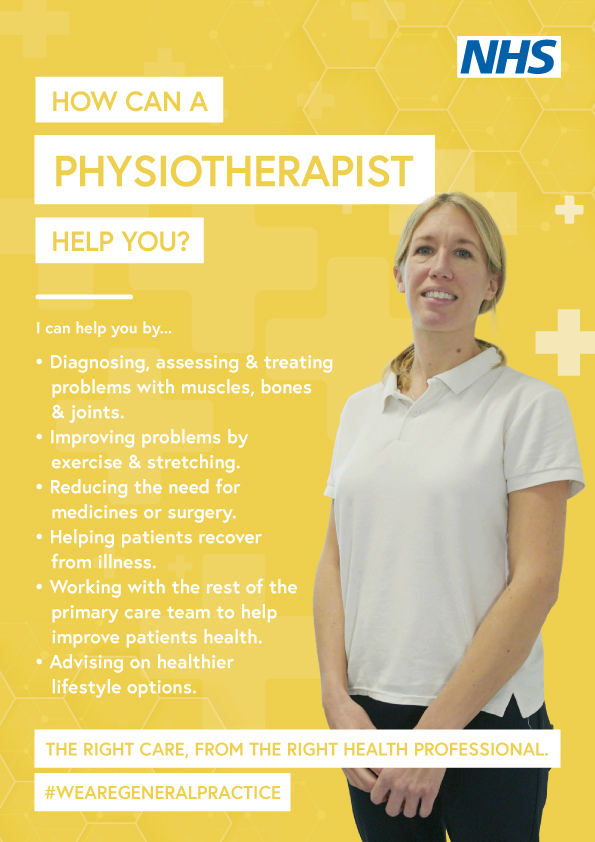Physiotherapists are qualified autonomous clinical practitioners who can assess, diagnose, treat and manage musculoskeletal (MSK) problems and undifferentiated conditions and – where appropriate – discharge a person without a medical referral. Physiotherapists working in this role can be accessed directly by self-referral or by staff in GP practices who can direct patients to them to establish a rapid and accurate diagnosis and management plan to streamline pathways of care.
Physiotherapists providing a first point of contact service means that patients presenting with a musculoskeletal problem for a GP appointment are offered an appointment with a physiotherapist instead. Physiotherapists working in general practice are able to address the needs of a large proportion of the patient population. They have the clinical expertise and autonomy to assess, diagnose and treat patients with a range of conditions, including MSK, neurological and respiratory conditions.
Physiotherapists can help patients with musculoskeletal issues such as back, neck and joint pain; assessing and diagnosing issues, giving expert advice on how best to manage their conditions, and referring them onto specialist services as and when necessary. It has been estimated that MSK conditions alone account for around one in five GP appointments.
Training/Development
- A physiotherapy degree (BSc) is required to work as a physiotherapist in any setting.
- For band 7 roles Health Education England Primary care First Contact Practitioner (FCP) capability training must be completed as the minimum threshold for entry to primary care and be supported by appropriate governance and indemnity.
- Health Education England primary care FCP training can begin 3-5 years postgraduate
- For band 8a roles the Health Education England FCP primary care training must be completed, and they must be working at an advanced level of practice i.e. at master’s level (level 7) across all four pillars of advanced practice.
The role of the Physiotherapist may include some of the following activities:
- To work as part of a multi-disciplinary team in a patient-facing role
- Provide clinical expertise, acting as first-contact physiotherapist and making decisions about the best course of action for patients’ care (including in relation to undifferentiated conditions). This will involve seeing patients, without prior contact with their GP, in order to establish a rapid and accurate diagnosis and management plan
- Progress and request investigations to facilitate diagnosis and choice of treatment regime, understanding the information limitations derived from these and the relative sensitivity and specificity of particular tests, request diagnostic services such as x-rays and blood test, and interpret and act on results to aid diagnosis and the management plans of patients
- Deliver programmes of supported patient self-management, in ways that facilitate behavioural change, optimise individuals’ physical activity, mobility, fulfilment of personal goals and independence, and that minimise the need for pharmacological interventions
- To help improve the quality of care and operational efficiencies to deliver an excellent and effective service within general practice See https://www.england.nhs.uk/gp/expanding-our-workforce/first-contact-physiotherapists/ and https://www.primarycarephysio.co.uk/ for more information and as reference to the above information.
Supervision for Physiotherapists in Primary Care
Appropriate supervision will be required for all physiotherapists working in Primary Care.
Existing GP Educational supervisors are able to supervise physiotherapists undertaking FCP and AP roles and do not need to attend additional training.
GPs who have completed the First Contact Practitioner Supervisor Development course can provide clinical supervision to physiotherapists undertaking FCP and AP roles.
Benefits to patients
- Quick access to expert physiotherapy assessment, diagnosis, treatment and advice
- Prevention of short-term problems becoming long-term conditions
- Improved patient experience
- A shorter pathway, so patients have fewer appointments to attend
- Simple logistics, so patients are less likely to miss appointments or to suffer administrative errors
- Opportunities to gain lifestyle/physical activity advice
- Longer appointment times, meaning patients feel listened to, cared for and reassured
- By 2024, all adults in England will to be able to see a musculoskeletal first contact physiotherapist at their local GP practice without being referred by a GP.
Benefits to PCN’s
- Release of GP time through reallocating appointments for patients with MSK problems (30% of all GP appointments)
- Reduced prescription costs
- In-house physiotherapy expertise gained 3 Increased clinical leadership and service development capacity
- Support in meeting practice targets
- Reduced pressure on GPs and other practice staff
- Making this part of the GP business model can optimise resources and reduce costs
- Services that generate additional income, eg the provision of steroid injections by FCPs can often be funded by local CCGs whereby GP practices are paid per injection.
Benefits to wider NHS
- Reduced number of physiotherapy referrals into secondary care
- Reduced demand and waiting times for orthopaedics, pain services, rheumatology and community physiotherapy and CMATS (Clinical Musculoskeletal Assessment and Treatment Services)
- Improved use of imaging 3 Continued support of individuals with conditions requiring physiotherapy is assured.

